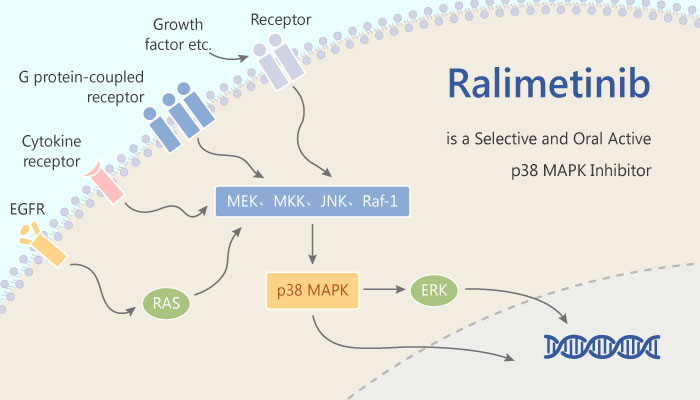Nowadays, cancer has become no stranger to people. We mentioned it many times in our blogs.
p38 MAPK (p38 mitogen-activated protein kinase) are a group of kinases responsive to stress stimuli. Once p38 MAPK activation occurs in muscle stem cells, it enhances muscle regeneration. There are four members of p38 MAPK, including p38α (MAPK14), p38β (MAPK11), p38γ (MAPK12/ERK6), and p38δ (MAPK13/SAPK4). As we all know, the kinase plays a role in signaling cascade, regulates cellular responses to cytokines and stress. However, its activation also happens in cancer cells due to multi-factors.
The actions of p38 MAPK are different among tumor types. Once p38 MAPK activation occurs, it will cause ovarian cancer cells to produce TNF-α and CXCL8. These cytokines enhance tumor vascularization. In SK-OV-3 ovarian and PC3 prostate cancer cells, p38 MAPK inhibition significantly reduces VEGF, bFGF, EGF, and IL-6 secreted by cancer cells.
Therefore, p38 MAPK inhibitors will play a vital role in cancer research. Ralimetinib (LY2228820) is a potent p38 MAPK inhibitor. Details are as follows.
Ralimetinib is selective, ATP-competitive against α- and β-isoforms of p38 MAPK, with IC50s of 5.3 and 3.2 nM, respectively. In cellular assays, Ralimetinib selectively suppresses the p-MK2 (phosphorylation of MK2 (Thr334)), but shows no effect on phosphorylation of p38a MAPK, JNK, ERK1/2, c-Jun, ATF2, or c-Myc.

In addition, Ralimetinib dose-dependently inhibits p-MK2 in mice bearing B16-F10 melanoma. The inhibition lasts for 4 to 8 hours at an oral dose of 10 mg/kg.
Ralimetinib is an inhibitor of p38 MAPK with great oral bioavailability. It possesses anti-cancer activity. Hope it will play an important role in cancer therapy.
References:
1. Campbell RM, et al. Mol Cancer Ther. 2014 Feb;13(2):364-74.